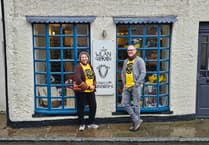The Welsh Government has unveiled its plans to introduce a statutory registration and licensing scheme for all visitor accommodation in Wales.
The plans have been announced by Deputy Minister for Arts, Sport and Tourism, Dawn Bowden, with legislation expected to be introduced to the Senedd before the end of the year.
The registration and licensing scheme is intended to deliver a register of visitor accommodation types and to enable providers to demonstrate compliance with safety and quality requirements.
The Welsh Government says the scheme is intended to 'enhance the visitor experience and visitor safety expectations in Wales by ensuring anyone who lets out visitor accommodation meets a relevant set of standards'.
Announcing the move, the Welsh Government said: "Many parts of the world have already adopted licensing, certification or registration schemes across their visitor accommodation sectors and the Welsh Government has been considering best practice to design one that is simple and easy to use for accommodation providers in Wales.
"Across the UK, Northern Ireland has had a certification scheme established for all visitor accommodation since 1992, with Scotland having recently introduced a licensing scheme for short term lets. The UK Government is also pursuing a registration approach for short term lets.
"In Wales, the first phase will be a statutory registration scheme for all accommodation providers, which will – for the first time – provide a register on the broad range of visitor accommodation available across the country and will include details on who is operating in the sector, where they are operating, and how they are operating."

Dawn Bowden said: “Tourism makes an important contribution to the Welsh economy and to Welsh life so this information will be crucial in helping us better understand the sector, as well as helping to inform future policy decisions at a local and national level.
“The visitor economy is changing rapidly, and while the growth of online booking platforms has brought many benefits, there are concerns around compliance with existing requirements and the impact of short-term lets on housing stock and our communities.
“I’d like to thank businesses across the visitor economy for the enormous resilience they’ve shown through the unprecedented challenges of recent years. The input from the sector, visitors and communities has been invaluable to our work so far. We will continue this engagement as we develop the scheme.”
Once a registration scheme is fully established, the intention is to follow with a licensing scheme for all visitor accommodation. This will initially focus on confirming compliance with safety requirements visitor accommodation providers should already be meeting, before looking at introducing quality standards at a later stage.
The Welsh Government’s Co-operation Agreement with Plaid Cymru commits to a statutory licensing scheme for holiday lets as part of a package of measures to address the negative impact second homes and short-term holiday lets can have on the availability and affordability of housing for local people in communities.
Designated Member Siân Gwenllian said: “Our plans for a statutory registration and licensing scheme for all visitor accommodation in Wales will help ensure the safety of visitors and seek to enhance the visitor experience.
“The plans will also create a more sustainable tourism offer – delivered in line with the needs and concerns of communities, particularly around housing.
“This will result in strengthened controls on residential properties operating as short-term holiday lets, leading to greater fair play for all.”
Responding to Welsh Government’s plan, Tom Giffard MS, Conservative Shadow Minister for Tourism, said: “There is a danger that this licensing scheme will be a raw deal for our tourism sector.
“Far from driving up standards, it appears that the Welsh Government’s scheme may simply increase red tape and serve as the foundation of their dreaded tourism tax.
“The Welsh Government should celebrate our tourism sector, not suffocate it with red tape and extra taxation.”




